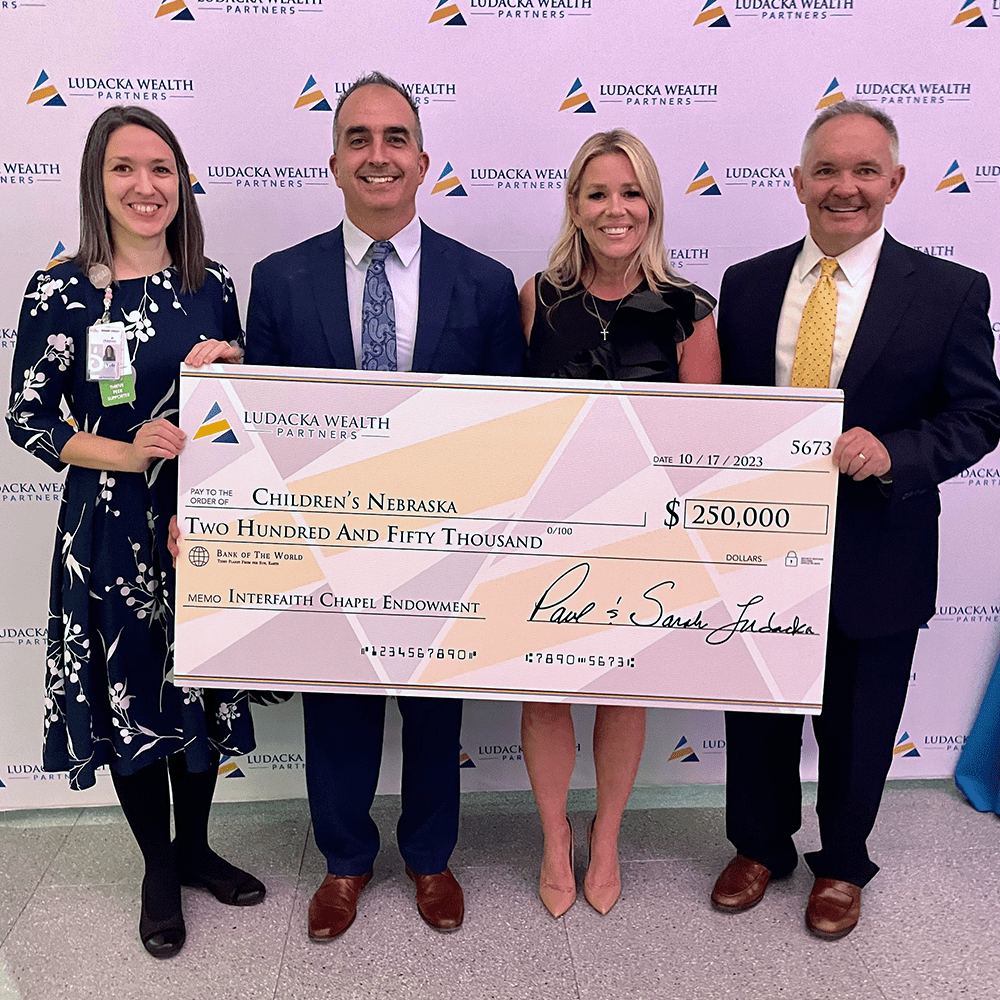Children’s COVID-19 Help Line
402-955-3200
Visit ChildrensOmaha.org/Symptoms to access Children’s COVID-19 Symptom Checker, an online assessment tool developed by Children’s to help parents and supplement our 24/7 COVID-19 Help Line.
COVID-19 and MIS-C Information for Providers
Read More
Children’s Response to the Covid-19 Pandemic
A Message to our Patient Families & Community from Children’s interim President & CEO Rodrigo López
Masks required at all Children’s locations
As we strive to keep all patients, families and health care workers safe, Children’s now requires every patient and their parent/guardian to wear a face mask while inside any of our buildings, including Children’s Physicians offices and specialty clinics. Families are welcome to bring their own cloth masks or non-health care grade masks from home to help Children’s conserve its supply of ear loop masks. This action follows recommendations made by the Centers for Disease Control and Prevention (CDC).
New Visitor Restrictions at All Children’s Facilities
To help reduce the spread of COVID-19 and keep patients, families and staff members safe, Children’s has changed its visitation policy to allow only one visitor at a time to any facility. Two caregivers will continue to be designated as visitors for each hospitalized child; however, only one may visit at a time. Exceptions will be made for end-of-life care, parents of neonates less than 72 hours postpartum and other specific circumstances.
In addition, no sick caregivers will be allowed on our premises. If a parent is symptomatic, another caregiver should accompany the patient. If a caregiver with symptoms arrives with a child at the Emergency Department, Respiratory Access Center or any other location, they will be masked and wait for another caregiver to arrive. We thank our patient families for their flexibility and cooperation at this unprecedented time.
Children’s Launches Respiratory Assessment Center
Children’s Nebraska has launched a dedicated Respiratory Assessment Center to address symptoms of respiratory illnesses, including COVID-19, in children and teens. The Respiratory Assessment Center is located on Children’s main campus at 84th & Dodge Streets. Please enter off of 84th Street at the Specialty Pediatric Center entrance, make an immediate right and park; the center’s entrance is south of the main Specialty Pediatric Center entrance.
Symptoms consistent with COVID-19 are: fever, cough, shortness of breath and/or sore throat. If your child has these symptoms or you are concerned about a potential exposure, please call your primary care provider or Children’s COVID-19 Help Line at 402-955-3200. If this is an urgent matter and your child needs immediate care on nights or weekends, please go directly to the Respiratory Assessment Center—not Children’s Urgent Care. Children’s Urgent Care will be sending patients with potentially infected respiratory symptoms to the center for care.
Multisystem Inflammatory Syndrome in Children (MIS-C) Information for Parents
Multisystem inflammatory syndrome in children (MIS-C) is a rare, but serious, condition where a child’s body parts — including the heart, lungs, brain, skin, kidneys, eyes and digestive organs — become inflamed. It’s similar to other inflammatory diseases, such as toxic shock syndrome and Kawasaki disease.
The exact cause is unknown, but it has been closely linked to COVID-19. Some children may not have had prior symptoms of a coronavirus infection, such as cough, but were exposed by others. Many children with MIS-C test positive for coronavirus (the infection that causes COVID-19). The ones who test negative often have positive antibody (a protein for fighting infection) test, which indicates that they had the virus in the past.
Most children with MIS-C do recover, but only with medical care. Without the right care, the condition can get worse and can even become life-threatening.
Call your child’s provider right away if they show these symptoms:
- Fever that lasts 24 hours or longer
- Abdominal pain
- Neck pain
- Rash
- Vomiting
- Diarrhea
- Bloodshot eyes
- Swelling or redness in the tongue and lips
- Feeling unusually tired
Get your child emergency care immediately if the symptoms are severe or if they show the following emergency warning signs:
- Difficulty breathing
- Pressure or pain in the chest that does not go away
- Bluish face or lips
- Confusion
- Inability to wake up or stay awake
- Severe stomach pain
MIS-C is typically diagnosed through blood tests or imaging tests, such as a heart or abdominal ultrasound or a chest x-ray.
Most children need to be treated in the hospital, and some in the pediatric intensive care unit (PICU). Treatment targets the immune system and reduces inflammation in vital organs, such as the heart or kidneys, to prevent permanent damage. Your child may also receive medicine or fluids that reduce symptoms and help them feel better.
At the moment, there’s no known way to prevent MIS-C. The best method is to continue to protect your child and family from COVID-19 using measures like mask wearing (over age 2), social distancing, frequent hand-washing, and disinfecting surfaces. Since your child may have COVID-19 at the same time as MIS-C, try to keep them isolated as best you can from the rest of your family until you have discussed it with a healthcare professional.
Hospital Information
Visitor Screening Update
All individuals entering Children’s facilities will be screened for travel and wellness upon arrival.
Children’s is not screening the general public for COVID-19 at this time.
Donations & Community Support
Please see our donation page for information on donations and community support.
Children’s Physicians Information
Children’s Physicians To Temporarily Restructure Office Visits
As we monitor the post-COVID-19 peak environment, we continue to strive to keep patient families safe by designating our office hours for well-check and sick-visit appointments by location.
Well-Check Appointments
Well-check appointments – both urgent and routine – are available at the following locations:
- Bellevue – 4802 Shannon Drive, Bellevue, NE
- Dundee – 4825 Dodge St.
- Eagle Run – 13808 West Maple Road
- Spring Valley – 4104 S. 50th St.
- Val Verde – 9801 Giles Road, Suite 1
Please note, the capability to schedule well-check appointments for your child through Children’s Connect has been reactivated.
Well-checks and Sick-visits
The Children’s Physicians offices listed below are designated for well-checks and sick-visits:
- Mission Village – 16909 Q St.
- Creighton – 2412 Cuming St., Suite 103
- Dundee Flats – 4835 Dodge St.
- West Village Pointe – 110 N. 175th St.
- Gretna – 11856 Standing Stone Dr.
- Embassy Park – 9202 W. Dodge Rd.
- UNMC – 982167 Nebraska Medical Center (42nd & Emile)
Well-checks, Sick-visits & Walk-ins
The Children’s Physicians offices listed below are designated for well-checks, sick-visits &, and walk-in visits:
- Council Bluffs – 1022 Woodbury Ave.
- Kearney – 211 W. 33rd St.
- Plattsmouth – 1938 E. Hwy 34
Visitor Protocols at Children’s Physicians, Urgent Care & Specialty Clinic Locations
All individuals entering Children’s facilities will be screened for travel and wellness upon arrival.
Urgent Care Notice
In an effort to conserve our clinical staff resources—and in response to lower patient volumes, we will be temporarily consolidating our Urgent Care services to one location. Starting Saturday, March 21, Children’s Urgent Care at Dundee and Val Verde will be closed; Urgent Care at West Village Pointe will be open. This is a temporary change due to the current health care climate, and we will keep you posted when we return to normal Urgent Care operations. We apologize for any inconvenience, and thank you for your flexibility in this challenging time.
Children’s to Modify Some Outpatient Specialty Clinic Visits
In our continued effort to reduce the spread of COVID-19 and keep patient families safe, Children’s will be modifying visit schedules with our pediatric specialists through July 1, 2020. Our specialists will see urgent visits (those needed in the next 7 days) as scheduled, but will also consider making the following modifications:
· Virtual Visits wherever appropriate
· Rescheduling non-urgent visits to the summer months
Each specialty has a specific plan based upon the patient needs and staff support required, and will work to modify the schedule two weeks at a time. Staff will contact patient families directly as needed to communicate and coordinate care.
Children’s Infusion Center and Dialysis clinic will continue regular operations. Sleep Lab and Neurodiagnostics will postpone non-urgent procedures. Our Spring Ridge outpatient specialty clinic will be closed until further notice. Our outpatient specialty services in Sioux City will be suspended, as well, with the exception of Cardiology services. Modifications at our Specialty Pediatric Clinic in Lincoln will occur and be communicated on a specialty-by-specialty basis.
Again, these modifications are being made to keep our patients, families and staff safe and healthy. We thank our patient families for their patience and cooperation at this unprecedented time.
Protecting yourself and your child from COVID-19
What is COVID-19?
 Coronavirus is a family of viruses that causes many cold and respiratory symptoms. The 2019 novel coronavirus (COVID-19) that has been declared a world health emergency is a new virus strain that was first identified during an investigation into an outbreak in Wuhan, China. Patients with COVID-19 have had mild to severe respiratory illness with symptoms of fever, cough or shortness of breath.
Coronavirus is a family of viruses that causes many cold and respiratory symptoms. The 2019 novel coronavirus (COVID-19) that has been declared a world health emergency is a new virus strain that was first identified during an investigation into an outbreak in Wuhan, China. Patients with COVID-19 have had mild to severe respiratory illness with symptoms of fever, cough or shortness of breath.
What can I/my child do to avoid getting COVID-19?
There is currently no vaccine to prevent coronavirus disease 2019 (COVID-19). The best way to prevent illness is to avoid being exposed to this virus. However, the Centers for Disease Control and Prevention (CDC) recommend preventative actions to help prevent the spread of respiratory viruses, including:
- Wash your hands often with soap and water for at least 20 seconds, especially after going to the bathroom; before eating; and after blowing your nose, coughing, or sneezing:
Source: CDC- If soap and water are not readily available, use an alcohol-based hand sanitizer with at least 60% alcohol. Always wash hands with soap and water if hands are visibly dirty.
- Avoid close contact with people who are sick.
- Avoid touching your eyes, nose, and mouth.
- Stay home when you are sick.
- Cover your cough or sneeze with a tissue, then throw the tissue in the trash.
- Clean and disinfect frequently touched objects and surfaces using a regular household cleaning spray or wipe.
Information & Resources
Tips for Adding Structure to Your Family Routine
Amidst school closures, schedule changes and working from home, there are lots of ways parents can introduce more structure into the family routine. Check out helpful tips and advice from Mike Vance, Ph.D., Children’s director of Behavioral Health.
Need ideas on what to do with the kids at home?
Check out Go Noodle, a great resource for videos, activities, and resources you can do at home! Including non-screen activity sugestions.
Go Noodle
COVID-19 Book for Kids:
Be a Hero Too
Sé un Héroe tú También (Spanish version)
COVID-19 Health Links:
How to Properly Use Hand Sanitizer Video
Nebraska Department of Health and Human Services
Iowa Department of Public Health
Douglas County (Nebraska) Health Department
Lincoln-Lancaster County (Nebraska) Health Department
Central District (Nebraska) Health Department



